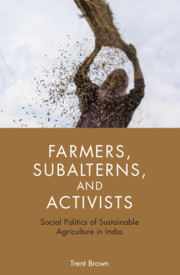Book contents
- Frontmatter
- Dedication
- Contents
- List of Images
- Acknowledgements
- 1 Introduction
- 2 India's Agrarian Crisis: A Gramscian View
- 3 Embedded in Power: Potentials and Constraints of Sustainable Agriculture
- 4 The Kheti Virasat Mission: People's Movement or Agrarian Populism?
- 5 The Tamil Nadu Organic Farmers’ Movement: The Limits of Participatory Approaches
- 6 The Beej Bachao Andolan: How ‘Grassroots’ is the Grassroots?
- 7 Conclusion
- Bibliography
- Index
1 - Introduction
Published online by Cambridge University Press: 08 July 2018
- Frontmatter
- Dedication
- Contents
- List of Images
- Acknowledgements
- 1 Introduction
- 2 India's Agrarian Crisis: A Gramscian View
- 3 Embedded in Power: Potentials and Constraints of Sustainable Agriculture
- 4 The Kheti Virasat Mission: People's Movement or Agrarian Populism?
- 5 The Tamil Nadu Organic Farmers’ Movement: The Limits of Participatory Approaches
- 6 The Beej Bachao Andolan: How ‘Grassroots’ is the Grassroots?
- 7 Conclusion
- Bibliography
- Index
Summary
The twentieth century brought unprecedented changes in the agrarian structure of many so-called developing societies. Major interventions into farming technologies and practices, the social relations of agricultural production, and the arrangement of global food distribution systems saw the emergence of what McMichael (2013) refers to as the ‘corporate food regime’. This refers to the global constellation of food and farming systems, which has been organised in such a way as to maximise opportunities for capital accumulation for large, multinational corporations and transnational finance, often through the exploitation and liquidation of labouring agrarian classes.
The Green Revolution, a capital-intensive rural development model introduced throughout the developing world from the 1940s to the 1970s, provided a key building block for this corporate food regime. In its endeavour to rapidly increase food production through use of high yielding variety (HYV) seeds, chemical inputs, modern irrigation systems, and mechanisation, the Green Revolution generated immense profits for transnational agri-business, whilst having mixed results for farmers and labourers on the ground. This greatly expanded the influence of transnational capital in third world agriculture, providing a basis for the increased corporate control and financialisation of agriculture from the 1970s onwards, ushering in the ‘corporate food regime’ in its current form (Patel, 2013).
The current social condition of rural societies throughout the developing world testifies to the major shortcomings of the Green Revolution and the corporate food regime. The Green Revolution imposed one-size-fits-all technologies that failed to adjust to the diverse social and ecological conditions at the grassroots (Altieri, 1984). As a result of side effects such as environmental pollution, increased vulnerability to pests and disease, declining soil fertility, and growing indebtedness, the yield increases observed in the early stages of the Green Revolution have, in many cases, not been sustained, leading to widespread economic stagnation in the rural societies of the Global South (Conway, 1985). This issue has been compounded by the growing influence of agri-business and finance over the food system, which have undermined farmers’ autonomy and introduced price instability, rendering rural livelihoods highly precarious (McMichael, 2013).
- Type
- Chapter
- Information
- Farmers, Subalterns, and ActivistsSocial Politics of Sustainable Agriculture in India, pp. 1 - 26Publisher: Cambridge University PressPrint publication year: 2018



